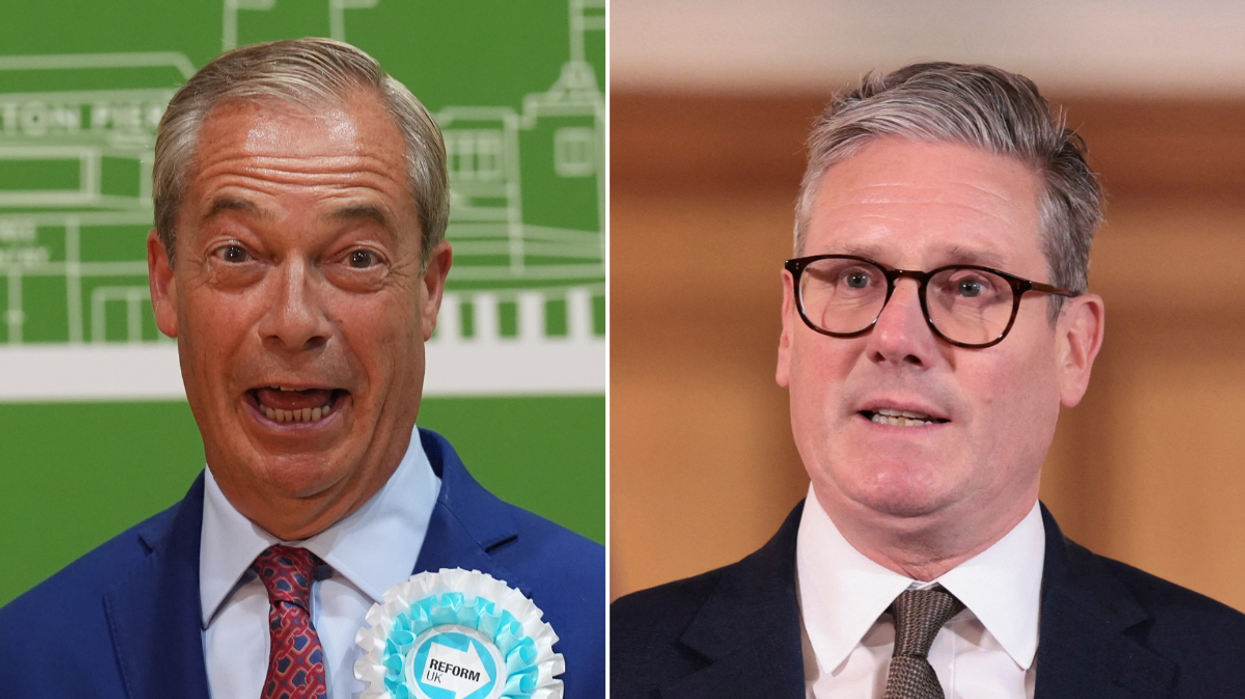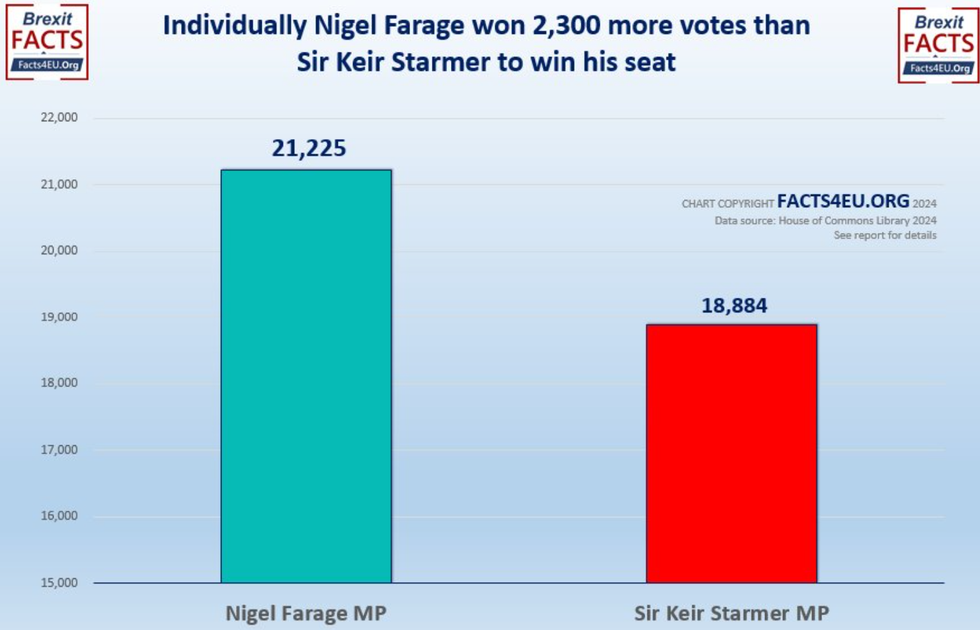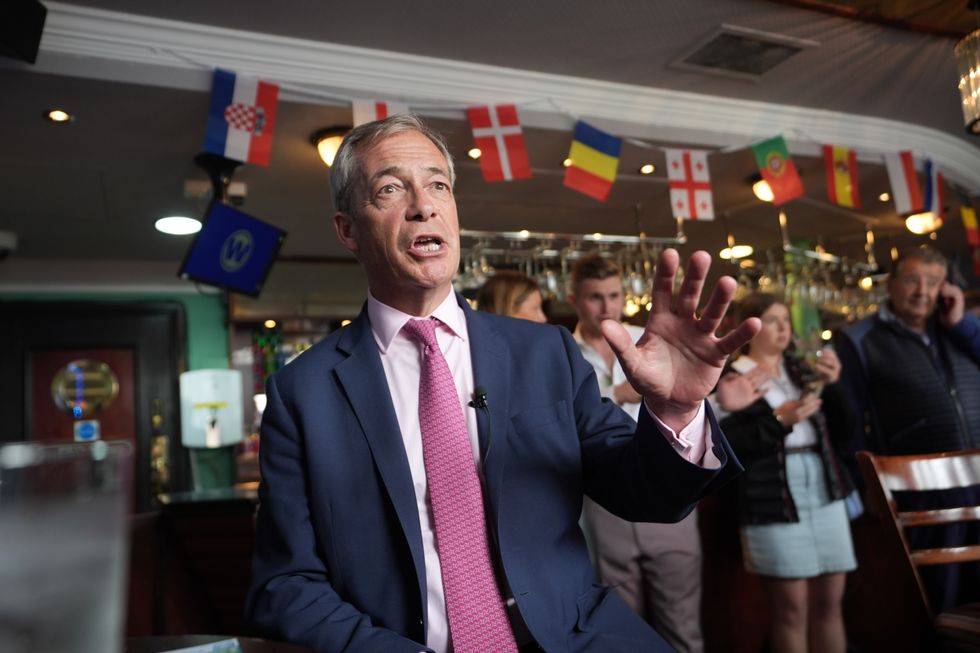How Nigel Farage beat Keir Starmer in the general election and is winning the popularity contest

Some 2,300 more people voted for Farage in Clacton than Starmer in London Holborn
|PA
The Reform leader inspired more people to cast their ballot in Clacton than in Starmer's constituency
Don't Miss
Most Read
Latest
Following the 2024 General Election, much of the attention focused on Labour’s landslide victory, leaving one particular result overlooked.
In their respective constituencies of Clacton (Essex) and Holborn (London), Nigel Farage beat Sir Keir Starmer in the number of votes he won and in the number of voters he inspired to turn out and cast their ballot on the day, a joint investigation by Facts4EU and GB News can reveal.
In Clacton, Nigel Farage won 21,225 votes whereas in Holborn & St Pancras Sir Keir Starmer won 18,884 votes.
Therefore, the Reform UK leader won 2,341 (12.4 per cent) more votes than the Labour leader.

Nigel Farage won 21,225 votes in Clacton compared to Starmer's 18,884 in Holborn & St Pancras
|© Brexit Facts4EU.Org 2024
But, by vote share, Farage won 46.2 per cent of the share, while Starmer edged ahead with 48.9 per cent.
What Nigel Farage seemed to be able to manage, however, was to inspire voters to come out and cast their ballot on July 4.
By turnout, Nigel Farage inspired 45,958 people to cast their vote in Clacton, while Starmer persuaded 38,602 to turn out.
The turnout was 19.1 per cent higher in Farage’s constituency than in the prime minister’s which is 7,356 more voters.
Farage also seemed to come from nowhere in the 2024 general election, announcing he would be standing to be MP in Clacton only about a month before the election.
In contrast, Starmer started from a base of 36,641 votes in the 2019 General Election.
Since then, his constituency boundaries were redrawn in the 2023 Boundary Commission review.
His voter numbers almost halved in 2024, to 18, 884, but only part of this drop can be attributed to the boundary changes.
Naturally, Keir Starmer won a larger personal majority than Nigel Farage, by 11,572 to 8,405.
But that said Farage’s majority of 8,405 came from nothing whereas Starmer has been the local Holborn MP for nearly ten years, since 2005.
To win at all, Farage had to overturn a Conservative majority of 24,702 achieved at the 2019 election. He not only overturned this but secured an impressive majority on top.
Since the general election, Farage also seems to be winning the popularity contest as Starmer continues to face controversy after controversy as prime minister.
According to YouGov’s popularity tracker, which measures opinions of politicians based on millions of responses from the British public, Farage is polling better than the prime minister.

Nigel Farage inspired 45,958 to vote in Clacton
| PALATEST FROM MEMBERSHIP:
According to the tracker, as of September 26, Nigel Farage has a popularity rating of 33 per cent while Keir Starmer’s rating has dropped to 22 per cent.
Keir Starmer has faced intense scrutiny in his first few months of power over policies such as the Winter Fuel Payment being cut for all but the poorest pensioners and releasing prisoners early to prevent overcrowding.
It was also revealed that the prime minister received £100,000 in tickets and gifts, which is more than any other recent party leader.
Then, the prime minister defended accepting £20,000 worth of accommodation by Labour peer Waheed Ali by explaining it was to help his 16-year-old-son study for his GCSEs.
A series of political controversies have led to the prime minister’s personal popularity rating plummeting.
The latest ‘Opinium’ polling for the pro-EU and left-leaning Observer newspaper showed Starmer’s rating has plunged by 45 points since the general election.










